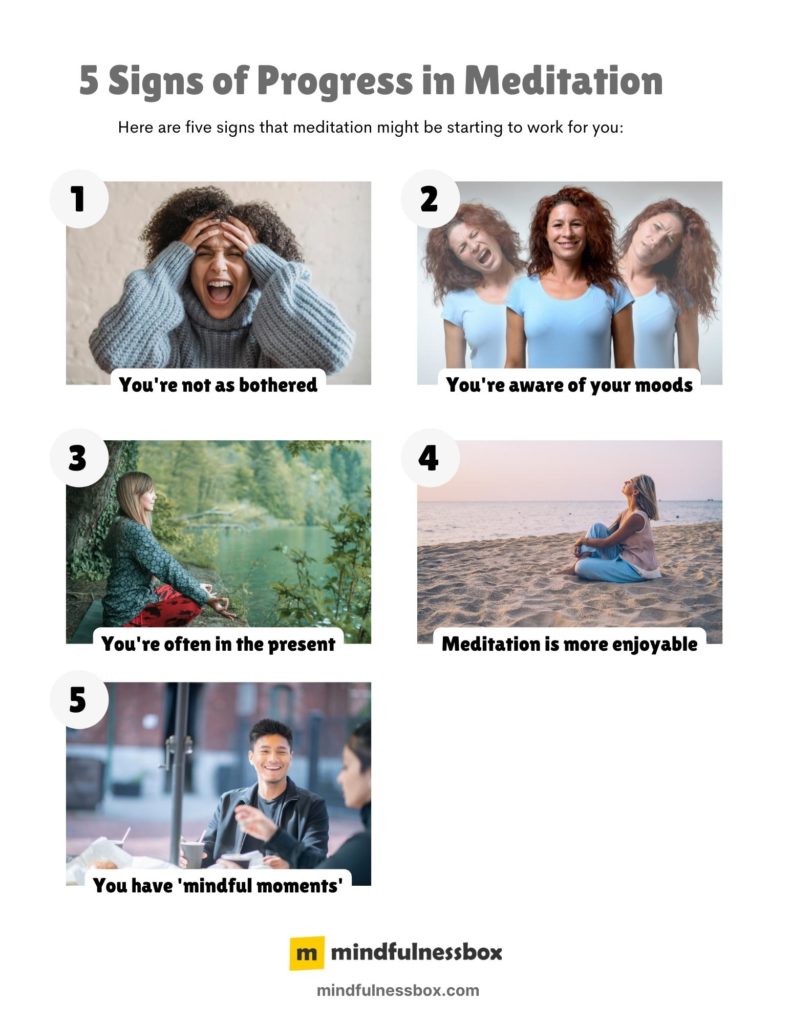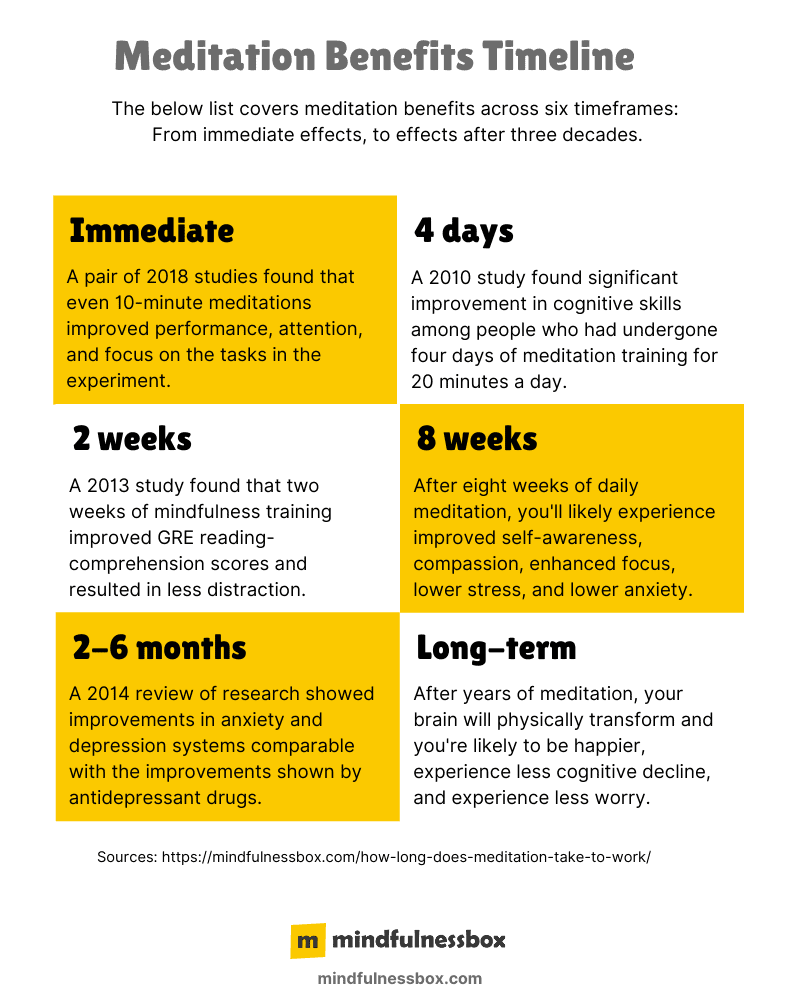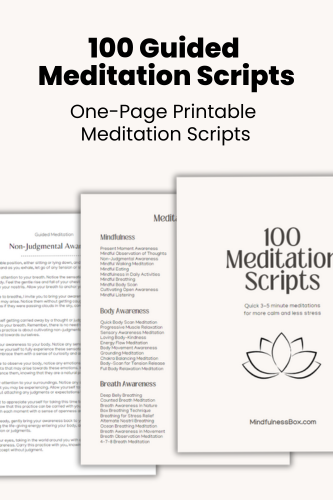Signs of progress in meditation are subtle. If you’re not as bothered by what used to bother you, you’re more often in the present, or you’re having random “mindful moments,” you’re probably making progress in meditation. The only way to see how much progress you make over time is to pay attention to your daily life and observe your meditation practice closely.
Humans like instant gratification. We’re wired that way.
Meditation is one of those tricky practices that we know are good for us, but that are tough to follow through on. That’s because the benefits can be imperceptible at the start. They take a long time to accumulate.
Like investing money to get compound interest, the benefits of meditation grow over time. But both require persistent effort.
But sometimes we want to get a sense for whether meditation is actually working for us.
These 100 meditation scripts were created to help beginner and intermediate meditators practice key mindfulness concepts like self-love, forgiveness, gratitude, and inner peace.
Designed to fit into busy schedules, each meditation script lasts 3-5 minutes. Perfect for starting or closing a group meditation; for yoga, coaching, or therapy sessions; or for your personal meditation practice.
How do you know if you’re making progress with meditation?

It can often be tough to tell if you are actually getting anywhere. After all, the goal is to achieve a state of mindfulness and inner peace, which can be hard to quantify.
For me, it took months before I felt like meditation was working. And even now, years into my practice, it often feels like meditation isn’t doing much.
But when I zoom out, I see that there have been changes in the way I interact with the world since I started meditating.
I’ve always been calm, so that wasn’t my challenge. My anxiety and rumination is still there, although both have subsided somewhat. But the biggest change is that I’m not triggered, annoyed or frustrated like I used to be.
All through my childhood, teenage years and early twenties, I was hyper reactive. Stimuli around me triggered me often (I’m a classic highly sensitive person). Meditation has helped ease those reactions. It’s helped train my mind to observe what’s happening in my environment with less judgment. It’s also helped me pause before reacting.
Your path is likely to be different.
But, there are a few things you can watch out for to notice when you’re making progress with meditation.
5 signs of progress in meditation

Here are five signs meditation is working:
- You’re not as bothered by what used to bother you. This has been a big one for me. It’s a good think f you notice you’re taking time before reacting. It’s good if you notice that what used to frustrate you no longer does. If this is happening, you’re in a different place than you used to be.
- You’ll be aware of your moods. When you’re in a bad mood and you don’t know it, it’s a difficult place to be. That’s because it becomes easy to project your feelings onto the world around you. When you’re aware of your moods, you’ll find you project less onto those around you. That’s because you recognize that you’re not in your normal frame of mind.
- You’re more often in the present. According to Harvard University, we spend 46.9% of each day stuck in the past or the future. The goal of meditation is to get that number down. When you notice that you’re spending more time in the present, it’s a sign that meditation is having an effect.
- Meditation is becoming enjoyable. Meditation isn’t always easy, but it can get easier over time. When you first start, your mind may struggle to bring your attention back to the present. It can be taxing. Your mind spends a lot of time resisting. As your practice goes on, the resistance lessens somewhat. Meditation can become a more enjoyable part of your day.
- You’re having random “mindful moments.” Give yourself credit for each mindful moment that happens. And they can happen at any time. A mindful moment is a moment during your daily life where you’re aware of what’s happening and take a pause. You might notice that your thoughts have become agitated. Maybe they’re gravitating towards the past or the future. When you notice this, you gently bring them back to the present.
To know if meditation is working, you need to observe your daily life

The best way to know if meditation is working for you is to pay attention to your daily life. Observe your meditation practice. Notice whether you’re better able to maintain your focus over time.
There’s a paradox involved in knowing if meditation is working:
There’s not much of a way to know if it’s working while you’re actually meditating.
Instead, you need to look at your life. Meditation is practice to help you be present later, in your daily life.
In some ways, it’s easier to notice that meditation is not “working” than that it is working.
You might find that despite your meditation practice, you’re finding yourself continuing to be upset by the same things. You continue to run the same mental programming, and you lack awareness of your moods.
To know when meditation is working, you need to flip this on its head. Pay close attention to moments of change in your life.
For example, you might find yourself less annoyed by things that used to bother you. You might find yourself taking a moment to think about how you want to respond before responding. And you might find yourself better able to practice nonjudgment and live in the present.
There’s no way to know if meditation is working without having awareness.
So, start with awareness. Pay attention to how you interact with the world and you’ll start to pick up on these subtle changes over time.
When does meditation usually start working?

You should expect it to take a few months to see discernable changes from your meditation practice.
It could take more or less — get a better sense for the meditation benefits timeline here. The beginning will be difficult. Your mind isn’t used to holding its attention so closely on different objects.
It also depends on how much time you’re able to dedicate to the practice. Experienced meditators measure their practice in thousands of hours of practice, rather than days or months.
If you’re able to do a weekend or weeklong meditation course, that may help. You may find that you’re able to make progress faster than if you meditated every day on your own.
That’s because during a weeklong meditation course, you’re likely to get dozens or even 100+ hours of meditation practice. That’s as much meditation practice as you’d get in a year of meditating 15 minutes per day.
Whichever route you choose, it’s important to be patient and keep with it. If you’re not seeing any changes after a while, don’t get discouraged. Instead, try to tweak your practice a little bit and see if that makes a difference. Sometimes all it takes is changing up your routine a bit to jumpstart your progress.
What does successful meditation feel like?

Successful meditation can feel easy, but successful meditation can also feel hard.
When meditation feels easy, your mind experiences extreme clarity. You find yourself living in the present moment in a way you normally aren’t able to. Calm and peaceful feelings are dominate in this experience of meditation.
When this happens, your task is to continue to focus on the present moment. At the same time, allow yourself to experience those good feelings nonjudgmentally.
When meditation feels hard, your mind is chaotic and busy and slipping often into the past and future. Anxious, frustrated feelings are dominant in this experience of meditation.
When this happens, your task is to gently bring your mind back to the present moment. At the same time, avoid judging yourself for the fact that your mind is busy.
Successful meditation can look like either one of these experiences. Meditation is simply a way to be more present and nonjudgmental in real life.
And in real life, you’re going to have easy, peaceful moments, and chaotic, stressful moments. Through all of these, you’ll need to stay present.
Have patience—the benefits of meditation can take time
When it comes to meditation, patience is key.
The benefits of practicing meditation can take time. Don’t get discouraged if you don’t see any changes right away.
When in doubt, mix up your practice. Try something new like mantra meditation or meditating for longer periods of time.
Remember that meditation is an experience that compounds over time. Small changes are happening in your mind that are imperceptible on a daily basis. But these small changes add up, and can be transformative over years.
Keep with it and be patient.
Over time, you’ll start to see the results you are looking for.

My mindfulness practice kicked off in 2016 with a ten-day silent retreat. Since then, I’ve read dozens of books about mindfulness and completed hundreds of hours of meditation. Thinking about what makes humans happy, calm, and peaceful is endlessly fascinating to me.


